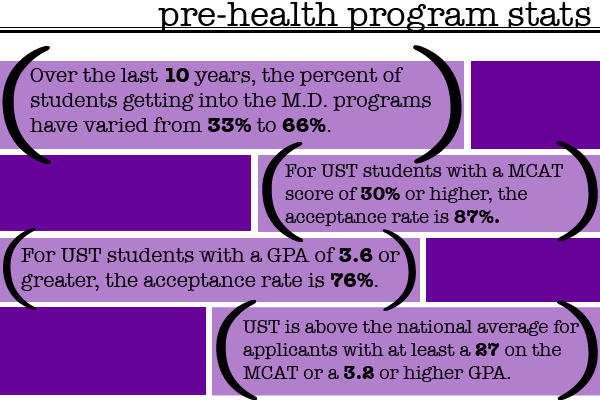The percentage of St. Thomas graduates accepted into medical schools decreased from 57 percent in 2010 to 34 percent in 2011, and after an external review of the university’s pre-health program, the department is taking action to address a number of concerns.
Roxanne Prichard, assistant professor and chair of St. Thomas’ Pre-Health Professions Advisory Committee, said the pre-health advising committee attended meetings put on by the National Association of Advisors for the Health Professions, and these meetings opened the department’s eyes to possible changes.
“We decided to do the external review because after attending the National Association of Advisors for the Health Professions, it was clear to us that our advising practices weren’t the best practices, and we wanted feedback from experts about how to improve our advising program,” Prichard said.
Prichard said the associate dean of admissions at the University of Minnesota Medical School and an adviser from the University of San Fransciso health professions program conducted the review.
Prichard added that both advisers talked with some of St. Thomas’ faculty and students.
The changes to the pre-health program will include a pre-health advising office in academic counseling in Murray-Herrick Campus Center and an academic counselor devoted to pre-health professions. An eight-session program designed to alleviate student concerns is also in place.
“The pre-health professions advising counselor will hold a full-time position as an academic counselor and will spend 80 to 100 percent of his or her time serving pre-health advising needs,” said Michael Jordan, associate vice president for undergraduate studies.
Prichard said the changes will allow students to ask questions about taking the Medical College Admission Test (MCAT) or applying to graduate schools.
“We’re going to try and help students, who after four years will go to medical and dental school, but also students who are looking for other valid programs, like occupational therapy or physical therapy and speech and language therapy,” Prichard said.
Senior Kim Hughes attended the sessions and said the guest speakers and the PowerPoint presentations give students opportunities to hear professional recommendations about the application process.
“It’s very informative, and it’s a small group so Dr. Prichard is able to answer personalized questions, which has been really great,” Hughes said. “Our pre-med committee is super important to the students because they have actually talked to the medical schools about what they are looking for and how to do this process.”
Sophomore Lauren Kvam plans to attend the sessions and agrees that the advice “will give us an edge in applying to other schools.”
The committee also anticipates receiving a space in the Murray-Herrick Campus Center for pre-health advising, and next year they will place a pre-health faculty member in Academic Counseling.
Kvam said she believes that the other changes will also be beneficial.
“It can only help because the more you do, the better. St.Thomas is taking an active interest,” Kvam said. “It goes back to the St.Thomas mission statement about preparing leaders and succeeding on your own.”
With a high number of applicants for such little space, Hughes said preparation is important to her.
“Most schools get 5,000 to 10,000 applicants for a class size of about 50 to 200 people. I’ll take all the advising I can get,” Hughes said.
Kelsey Broadwell can be reached at broad3324@stthomas.edu.
Graphic created by Genevieve Cossette.



Just a clarification about the graphic. For UST students with a 30 or higher cumulative score on the MCAT, the acceptance rate is 87%.
About time!